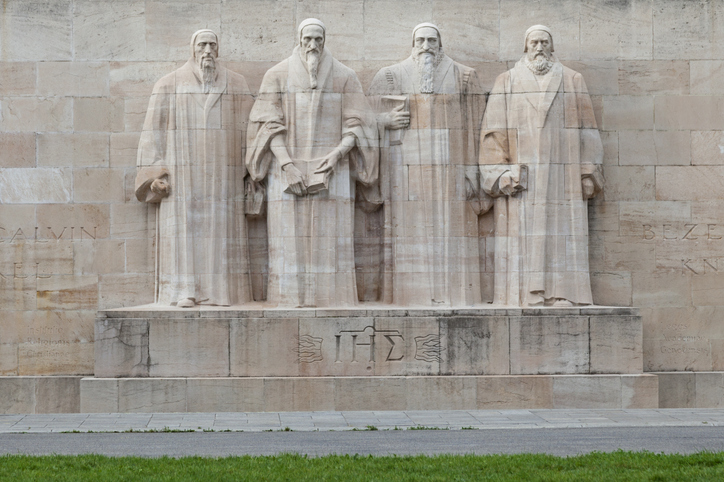
The Reformed Church is a main branch of Protestantism, also known as Calvinist Christianity, Reformed Christianity, Reformed Protestantism, and the Reformed Tradition.
The 16th century saw a major schism in Christianity when the Protestant movement broke away from Roman Catholicism. This represented a radical rejection of authority with instigators bravely facing the real threat of imprisonment or death, while at the same time venturing into uncharted spiritual territory that potentially risked being outcast.
Such an environment breeds exceptional people of character, and John Calvin (1509-1564) was one of several founders of what would become the defining doctrine of a new religious movement. Calvin was born in France and came of age at the height of the Protestant Reformation, first studying to become a Catholic priest and then changing his early career to law.
Explore a Christian Ministry Degree – Request More Info Today!
Lutherans derisively called this new movement Calvinism; movements seen as being heretical were often named for their founding thinkers.
However, most Calvinists prefer to use names for their religion that emphasizes its reformation and distinction from other Protestant branches. Today’s Reformed Churches include:
- Continental Reformed Protestantism
- Presbyterianism
- Evangelical Anglican
- Congregationalist
- Reformed Baptist
What Does the Reformed Church Believe?
As Protestants, Reformists reject the authority of the pope, the notion that humans can buy their way into heaven, and the idea that a special divinely-superior class of priests are necessary to reveal the word of God in the Bible to fellow believers.
Reformed Churches accept Jesus Christ as God’s only Son who died for the sins of humanity, and hold the Bible, including the Old and New Testaments, as their holy book.
Reformed Churches use a helpful acronym to sum up how they’re distinguished by their beliefs: TULIP. These are also known as the Five Points of Reformed theology:
- Total depravity – People are selfish by nature and beholden to sin; they’re incapable of rejecting sin. This belief has its roots in Calvin’s interpretation of the doctrine of Original Sin.
- Unconditional election – God chooses who gets into heaven –“the elect”– based solely on His discretion and mercy; people cannot influence this.
- Limited atonement – Jesus’ sacrifice of dying for the sins of others is atonement, however this atonement is reserved only for those who God chooses as being worthy of entering heaven.
- Irresistible grace – Although people live in a state of total depravity, those who are chosen by God for an afterlife in heaven will be unable to resist an inner call from the Holy Spirit to repent from their sinful ways and choose to follow Christ.
- Perseverance of the saints – With “saints” referring to the elect, those chosen by God to enter heaven, this belief holds that God’s chosen will always remain chosen thanks to God’s divine mercy, and those who are not will always remain un-chosen.
The Main Points of Disagreement Around the Calvin-Arminius Split
 In the early 17th century, a fierce debate among Reformists resulted in a fracturing of the movement. The Dutch theologian Jacobus Arminius sparked this ideological disagreement with the traditional Calvinist Reformists, establishing a movement that would bear his name, Arminianism.
In the early 17th century, a fierce debate among Reformists resulted in a fracturing of the movement. The Dutch theologian Jacobus Arminius sparked this ideological disagreement with the traditional Calvinist Reformists, establishing a movement that would bear his name, Arminianism.
Main disagreements centered on the details of some of the Five Points:
- Whereas Calvinists believe God chooses the elect people for salvation based on His designs and mercy alone, Arminianists believe that people’s faith in God can have an influence on whether or not they’re chosen for salvation.
- Whereas Calvinists believe Jesus’ sacrifice provides atonement for only the elect who will see salvation, Arminianists hold Christ’s sacrifice as being for all humanity, though only those who have faith in Christ can be saved.
- Whereas Calvinists believe in the depravity of humans, Arminianists believe that humans can use their free will to make good choices that will help achieve salvation.
- Whereas Calvinists believe the elect who are chosen for salvation are permanently predestined to their fate, Arminianists believe that salvation is not predetermined and that a person’s actions can affect their chances for redemption.
Initially, the adherents of Calvin and Arminius considered their beliefs to be similar enough that they could co-exist as two separate branches of the Reformed Church. But over time the differences became cemented and led to different traditions.
Today’s descendants of Arminianism can be found among the following, and no longer consider themselves to be a branch of Calvinist theology:
- Certain Mennonite branches
- Certain Methodist churches, especially the Wesleyan Church
- Seventh-day Adventists
- Pentecostals
- Baptist branches
Reformed Christianity Includes Many of the Most Widely-Recognized Churches
 Reformed Church membership accounts for around nine percent of all Protestants worldwide. Like in many Protestant branches, Reformed Church organizations exist as like-minded church groups from across the world that share similar founders, beliefs, and history.
Reformed Church membership accounts for around nine percent of all Protestants worldwide. Like in many Protestant branches, Reformed Church organizations exist as like-minded church groups from across the world that share similar founders, beliefs, and history.
The largest Reformed Church organization is the World Communion of Reformed Churches, founded in 2010 through significant mergers of older organizations and headquartered in Hanover, Germany. It’s comprised of 230 different member denominations with locations in 108 countries. With a prominent subsidiary organization in Grand Rapids, Michigan, US member denominations include:
- Presbyterian Church USA
- Reformed Church in America
- United Church of Christ
- Evangelical Presbyterian Church
- Cumberland Presbyterian Church
Founded in 2000, the World Reformed Fellowship is another significant organization with 115 organizational members from across the world. In the US these include:
- Presbyterian Church in America
- United Episcopal Church of North America
- Christian Reformed Church in North America
- Reformed Baptist Churches in North America
- Associate Reformed Presbyterian Church USA
The International Conference of Reformed Churches counts dozens of members and was founded in 1981. U.S. members include:
- Canadian and American Reformed Churches
- Associate Reformed Presbyterian Church
- Reformed Presbyterian Church of North America
- Reformed Church in the United States
- Heritage Reformed Congregations









